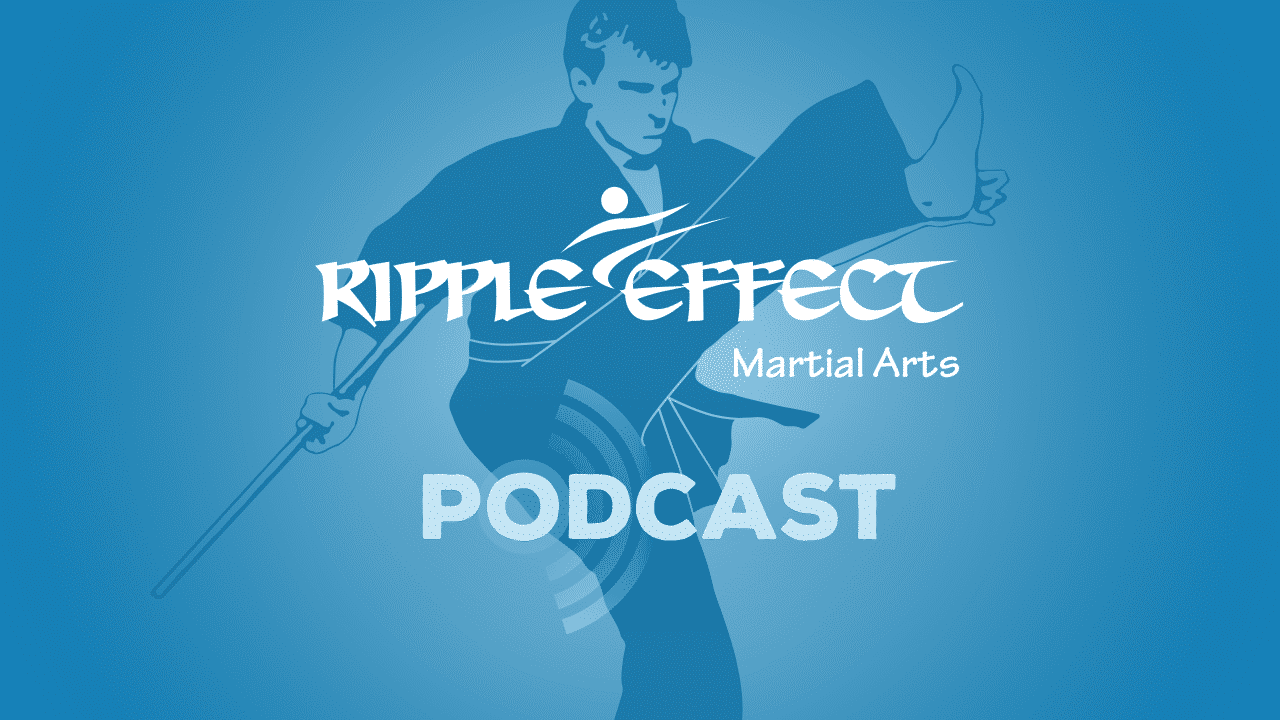On our very first episode of the Ripple Effect Martial Arts podcast, I was honored to talk with Mr Devin Arkfeld. He’s a fifth degree black belt in Taekwondo. He’s also a decorated nunchaku wizard. Mr Arkfeld placed second in the 2019 Golden Combo Tournament and earned second place again in the 2020 FNF (Freestyle Nunchaku Forum) competition.
Listen to the full podcast here, and read on for some highlights of our discussion about what it means to earn a black belt, teaching martial arts to kids, nunchaku competition, and how martial arts training teaches you to learn from failure.
On Respect, Discipline and Perseverance in the Martial Arts
[Mr Arkfeld] I got started when I was eight years old, at Mile High Karate, and it wasn’t the most noble reason to start [karate training]. I just wanted to be able to beat people up [laughs]. This was because [back then] my sister would just wreck me every day. I wanted to be able to fight back.
My first karate instructors at Mile High Karate helped my confidence grow and helped me tame that aggression. The environment [in the karate school] was so fun, that aggression wasn’t at the forefront of my mind at all. The school and the instructors and the other kids provided a good, comforting sort of environment where I could be myself, have fun and then also happen to learn martial arts on the side. [Laughs]
On Training in the Tradition of Grandmaster Jhoon Rhee
[Mr Arkfeld] I remember meeting Jhoon Rhee. I’ve read his writings too, and this is exactly what was in his mind when he wanted to bring martial arts to America. This [martial arts philosophy] is what he was presenting to the United Nations as a peacemaking tool.
I continued training in the Jhoon Rhee tradition of American Freestyle Tae Kwon Do, virtually nonstop. I went at least twice a week, often more. It was just a part [of my life] as I made it through my middle and high school years.
I got my black belt when I was 14, like 8th grade or so, and that was awesome. It was at one of those Breckenridge [black belt] tests.
On Black Belt Testing
[Mr Brady] Can you explain for people who don’t know what one of those black belt tests is like?
[Mr Arkfeld] Back in my day it was once a year during October/November, starting on a Friday night at 6:00 o’clock. It would go all the way to the middle of the day on Sunday, probably ending at 5:00 o’clock at the latest.
And I don’t mention any sleep in there [laughs] You will get some sleep. But, you know, you definitely don’t want to fall asleep when a Master’s talking, that was truly the hardest for me.
After more sparring, after more workouts, after not that much sleep, then you got the formal test. You’re tired, but just like in martial arts, your opponent doesn’t care. You still have to do it. You gotta do it well and then nothing is better than doing that Victory Circle at the end, where you know everybody’s clapping during this little party.
On Leadership and Teaching in the Martial Arts
[Mr Arkfeld] I was a second degree black belt when I started teaching, and I was the top ranked student in my school. So I just took that up [teaching/instructing].
[Mr Brady] Did you feel ready to teach?
[Mr Arkfeld] I was ready to stand at the front of the class. I didn’t have much anxiety with that because I had a lot of experience with leadership. But I felt out of ideas at the same time; it was like a bird getting kicked out of the nest. You know, learning to fly right there in front of everybody.
But I really enjoyed it. It was a stressful start but as I taught more classes it became a smoother ride. I found my identity with the [karate] school. Because in martial arts when does that not happen? When does something unexpected not fly your way? You know? So you gotta be ready for it.
On Sparring and Competition
[Mr Brady] Speaking of sparring or just generally competition, that’s another place where you’ve practiced and practiced. Now it’s time to compete in a tournament, in front of everyone. What was your first experience in martial arts competition?
[Mr Arkfeld] I started in intramural tournaments that my schooI used to hold all the time with our sister schools. We know each other and it’s just good friendly competition.
My first martial arts tournament outside of the intramurals was in February last year [2020], and that was a different kind of feeling. It was a karate-style tournament and it was very different
because you know we’re a little more sporty in American Freestyle Taekwondo and we go pretty darn fast, with intensity in every move.
I felt a lot more energetic and confident in my performance even at an unfamiliar place, so I think [the competition was] good training, especially if you want to go over to compete in bigger competitions in your martial arts career.
On How a Martial Arts Education Helps Prepare You for Life
[Mr Brady] I think it does address that question because again, when someone’s beginning in a martial arts program, it’s like, well, what am I going to get out of this? And I think you’ve hit it several times. It’s preparation for what comes next in life, what you can’t imagine that you would encounter.
A few years ago I went with a group of teachers and kids for a tour of a fire station. We got a tour of the whole station and you get to look at where the firefighters sleep, where they eat and where they prepare. Every firefighter had this neatly packed locker and knew exactly where to go and what to do when that alarm bell rings. It was pretty intense. Equipment and their suits and everything, none of which can be neglected at all.
This equipment is absolutely necessary for their lives, and I thought, “Wow, this looks like Prep Cycle [the training cycle karate students undergo prior to Black Belt testing].” Martial arts prepares you for life because for years you have to take care of dozens of weapons and items and your uniform and be able to transport them and rearrange them and be in the right place and position, ready for anything.
[Mr Arkfeld] Yeah, all within the time limit too. Getting all your sparring pads on, for instance, within a minute or two minutes. You could be in the middle of performing [tae kwon do form] Chon Ji [Heaven and Earth] and now an instructor yells “all right, get your pads or grab your weapons.” It happens hundreds of times. The fire station’s a great analogy.
On Training and Competing with Nunchucks/Nunchaku
[Mr Arkfeld] Since I started martial arts when I was eight years old, I took up the nunchucks immediately. But I wouldn’t say I was super mega obsessed with [nunchucks] back then.
About three years ago, while I was in college, I’d just finished some homework and I looked at my nunchucks and something just clicked. [From that moment] I started working with nunchucks all the time, constantly seeing what else was out there. I would catalogue my progress on Instagram and kept that up as a public promise to keep getting better.
Pretty soon I was invited to compete in a tournament out of Europe, and the organizer actually gave me some tutorials. He was so passionate about helping others improve and give their best performance at the tournament, which I am so mega thankful for.
I spent anywhere between 5 minutes to 3 hours a day working on my chucks, hitting myself in the face, dropping them, annoying people when they make sounds. The final video clip I submitted got me second place in the world, and it took me about 27 hours to nail.
On Overcoming Failure and Reaching Your Goals
[Mr Brady] I think society in general puts so much emphasis on winning, winning, winning and the flip side of that is, well, if I’m not winning, am I losing? And really, it’s like that Edison quote. “I haven’t failed. I’ve just found 10,000 ways that don’t work.”
[Mr Arkfeld] I’m really into space, and with rocket launches in the beginning, most of them failed, but they got higher and higher. And eventually they made it to outer space. So who says something is not possible? Why is a goal not realistic? I want to look back without regret, instead saying “that was awesome. I did it.”
Find more on Devin Arkfeld on Instagram at @DevMode_nunchaku and YouTube.


